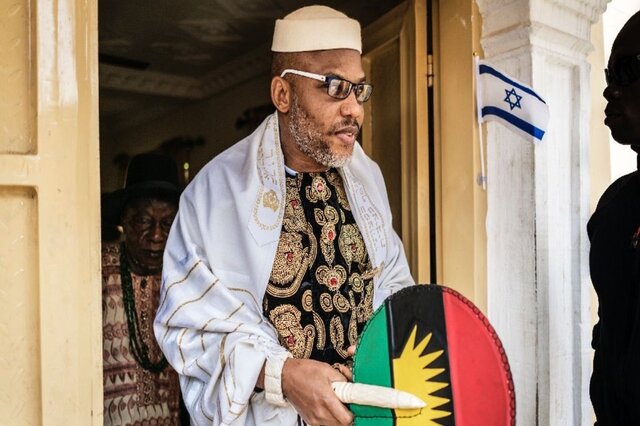Abuja – Lawyers representing a Nigerian separatist leader said on Thursday a fresh ruling by an appeals court had acquitted him, though for now he remains in custody.
Nnamdi Kanu is the leader of the outlawed Indigenous People of Biafra (IPOB) group, which campaigns for a separate state for the Igbo people in southeast Nigeria.
The ruling referred to Kanu’s arrest abroad and transfer to Nigeria, a process which his lawyers had argued was illegal and thus invalidated his prosecution.
“Extraordinary rendition is a barrier to the trial of Nnamdi Kanu,” one of his lawyers, Aloy Ejimakor, tweeted.
“He’s therefore discharged of all charges.”
UPDATE: Nigerian separatist leader acquitted of terrorism charges https://t.co/KfrNNCS2KW
— Talk 1370 (@TALK1370) October 13, 2022
But the office of Nigeria’s attorney general and justice minister Abubakar Malami said the ruling was based on the rendition issue only.
“Other issues that predate rendition… remain valid issues for judicial determination,” Malami’s spokesman Umar Jibrilu Gwandu said in a statement.
Kanu, a British citizen, was arrested in 2015 but jumped bail two years later, reappearing later in the UK and Israel.
In June, Nigerian authorities announced that Kanu had been brought back to Nigeria to face terrorism and treason charges. Kanu’s family and lawyers said he was illegally brought into the country from Kenya.
On Thursday, two of his lawyers, Ejimakor and Ifeanyi Ejiofor, said a court of appeal in the capital Abuja had acquitted and discharged him.
“Onyendu Mazi Nnamdi KANU, discharged and acquitted. We have won!” Ejiofor wrote on his Facebook page.
Ejimakor confirmed the ruling to AFP.
“He was discharged of all charges,” Ejimakor said in a text message. “Processing his release will start tomorrow.”
ALSO READ | Nigeria floods kill 500, displace 1.4 million people
It was unclear on Thursday whether Kanu would be released from custody.
Amnesty International welcomed the court’s decision.
“The Nigerian authorities must abide by the ruling, in compliance with its human rights obligations,” the rights group said on Twitter.
Calls for autonomy are especially sensitive in Nigeria, where a civil war in the 1960s left around one million people dead from fighting and starvation.
Tensions in the southeast are still present, with occasional attacks against security forces and government offices.
Police have blamed IPOB’s military wing, the Eastern Security Network or ESN, but the group denies any involvement in the violence.
Follow African Insider on Facebook, Twitter and Instagram
Source: AFP
Picture: Twitter/@gaiuschibueze
For more African news, visit Africaninsider.com


